7 Fascinating Facts About Valentine Week That Will Surprise You
Introduction:
Valentine's Week, the time when love is celebrated and cherished, is not just about chocolates, flowers, and romantic dinners. It's a week filled with traditions, history, and intriguing customs that have evolved over centuries. Let's dive into the heart of Valentine's Week and uncover seven captivating facts that may surprise you.
Origin of Valentine's Week:
Valentine's Week originates from the ancient Roman festival of Lupercalia, which was celebrated from February 13th to 15th. This pagan festival honored Lupercus, the Roman god of fertility, and was later Christianized by the Catholic Church.
The Legend of Saint Valentine:
The most popular belief behind Valentine's Day traces back to the legend of Saint Valentine, a Roman priest who defied Emperor Claudius II's ban on marriage for young soldiers. Saint Valentine continued to perform marriages in secret, leading to his eventual martyrdom on February 14th, around 270 AD.
Saint Valentine
The First Valentine's Day Card:
The tradition of exchanging Valentine's Day cards dates back to the 15th century. The oldest known Valentine still in existence is a poem written by Charles, Duke of Orleans, to his wife while he was imprisoned in the Tower of London in 1415.
Valentine's Day Around the World:
While Valentine's Day is celebrated globally, different countries have their unique customs. In Japan, it's customary for women to give chocolates to men on February 14th, while men reciprocate on March 14th, known as White Day. In South Korea, the 14th of every month has its significance, such as Black Day on April 14th for singles to mourn their status with black noodles.
South Korean Black Noodles (Jajangmyeon)
Valentine's Week Timeline:
Valentine's Week consists of seven different days, each with its own significance. It starts with Rose Day on February 7th, followed by Propose Day, Chocolate Day, Teddy Day, Promise Day, Hug Day, and finally, Valentine's Day on February 14th.
Anti-Valentine's Day:
Not everyone celebrates Valentine's Day in the traditional sense. Some people choose to observe Anti-Valentine's Day or Singles Awareness Day on February 15th, embracing their independence and celebrating self-love or friendship.
Economic Impact:
Valentine's Day is not only a day for love but also a significant economic driver. According to the National Retail Federation, Americans spent over $21 billion on Valentine's Day in 2021, with the average consumer spending around $165 on gifts, dining, and other experiences.
Conclusion:
Valentine's Week is more than just a time for romantic gestures; it's a blend of history, culture, and modern-day traditions that bring people together to celebrate love in all its forms. Whether you're exchanging chocolates, sending cards, or simply spending time with loved ones, Valentine's Week offers a chance to cherish those closest to us and appreciate the enduring legacy of love throughout history.





Comments
Post a Comment